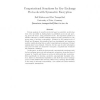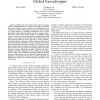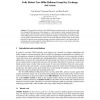576 search results - page 7 / 116 » Modeling Adversaries in a Logic for Security Protocol Analys... |
CCS
2009
ACM
14 years 2 months ago
2009
ACM
Formal analysis of security protocols based on symbolic models has been very successful in finding flaws in published protocols and proving protocols secure, using automated too...
ICNP
2007
IEEE
14 years 1 months ago
2007
IEEE
— While many protocols for sensor network security provide confidentiality for the content of messages, contextual information usually remains exposed. Such information can be c...
CANS
2009
Springer
13 years 11 months ago
2009
Springer
We extend the well-known Tree-Diffie-Hellman technique used for the design of group key exchange (GKE) protocols with robustness, i.e. with resistance to faults resulting from poss...
CORR
2006
Springer
13 years 7 months ago
2006
Springer
Knowledge flow analysis offers a simple and flexible way to find flaws in security protocols. A protocol is described by a collection of rules constraining the propagation of know...
ASIACRYPT
2007
Springer
14 years 1 months ago
2007
Springer
Abstract. In the standard general-adversary model for multi-party protocols, a global adversary structure is given, and every party must trust in this particular structure. We intr...



